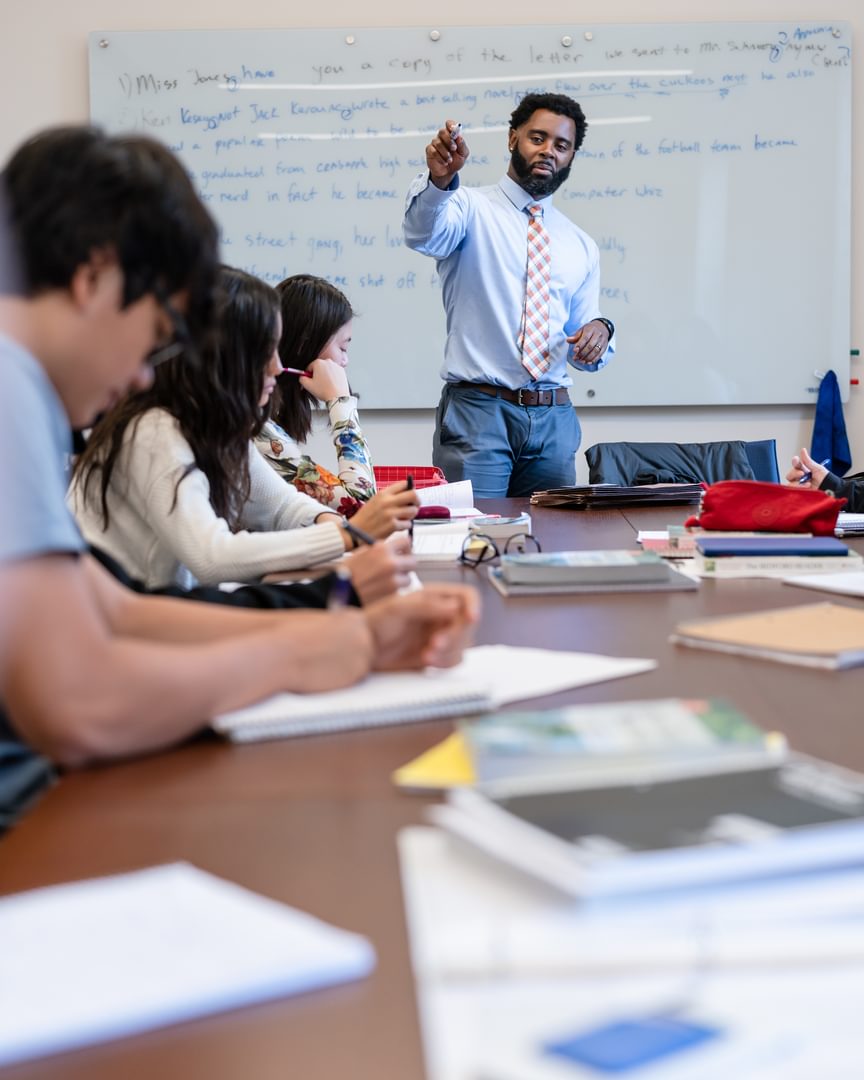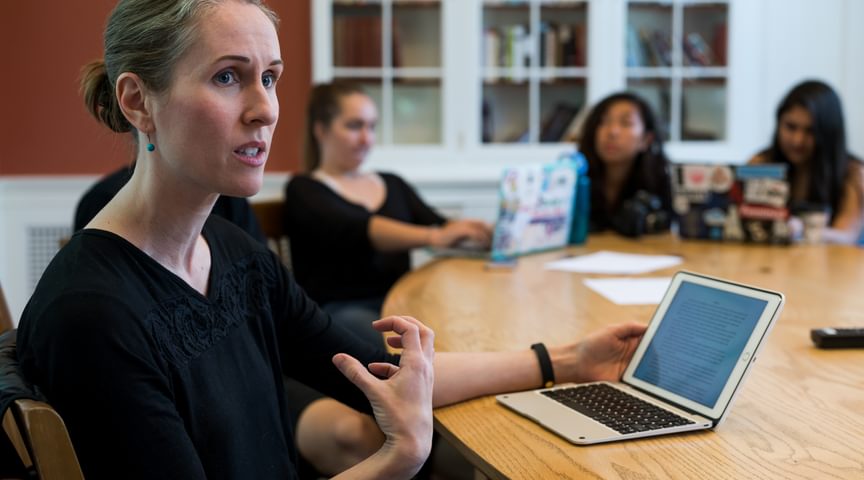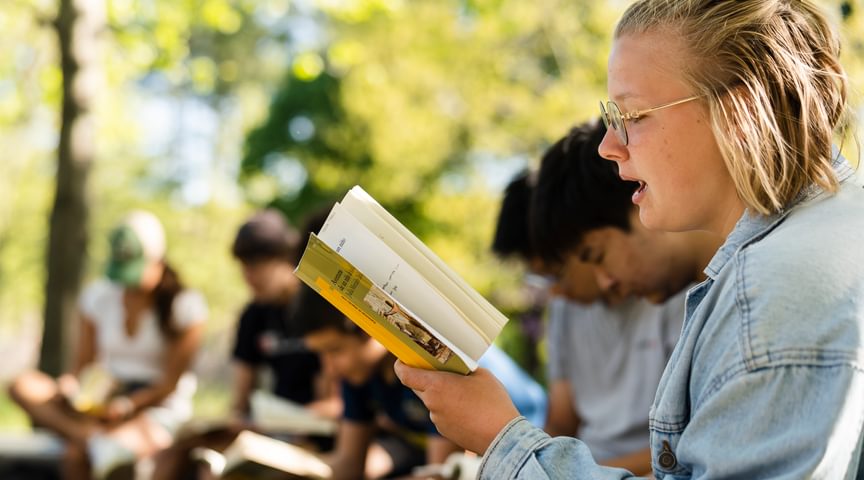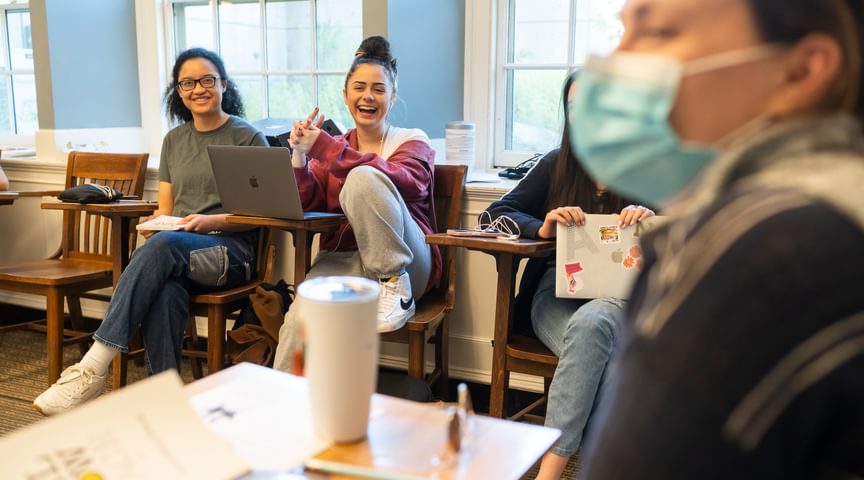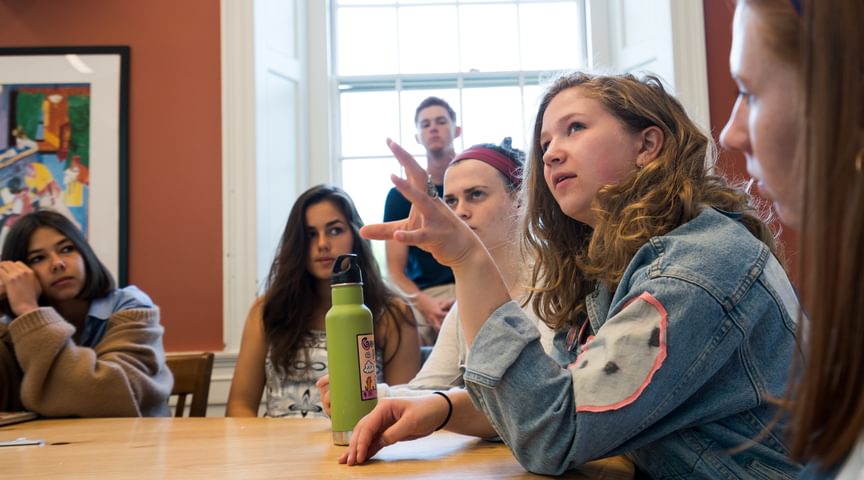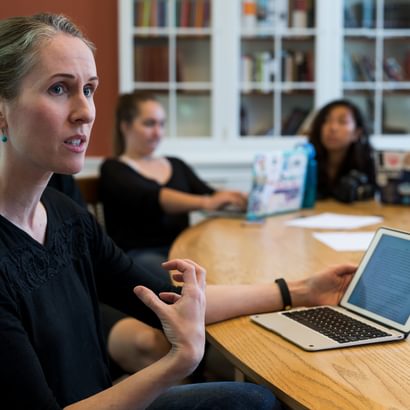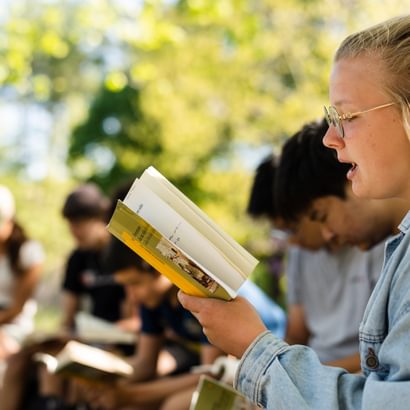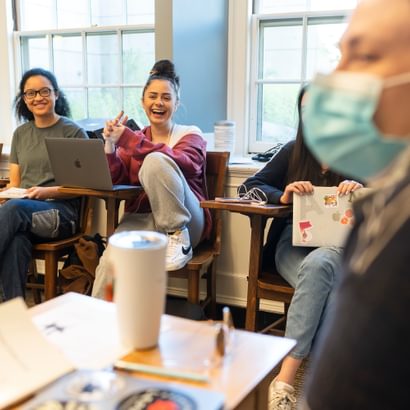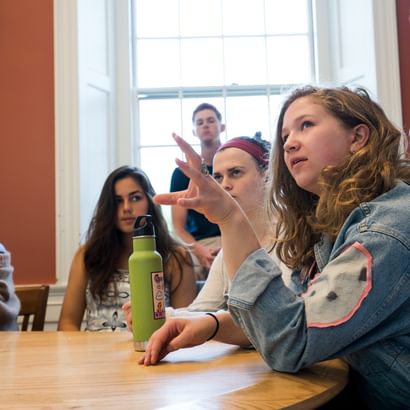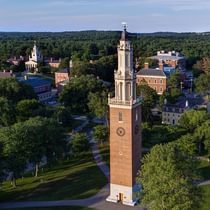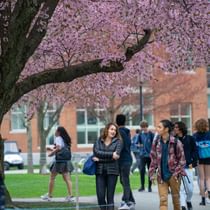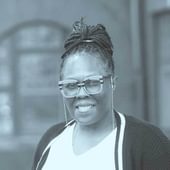
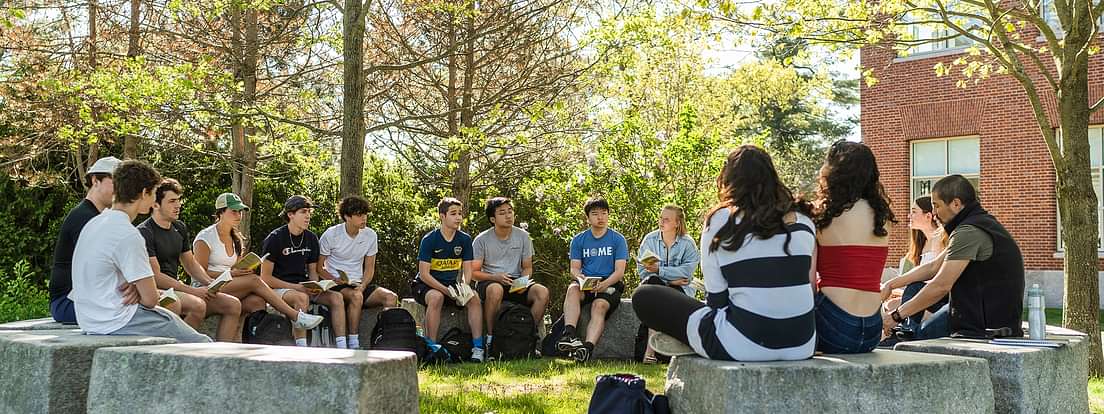
English Department
The Written Word
Located in Bulfinch Hall, Andover’s English Department fosters curiosity, imagination, and the love of language, equipping our students with skills to understand and interpret the many voices of literature across different eras, genres, and cultures. Authentic connections are a hallmark of a Bulfinch classroom—with and across texts, with their peers, with the instructor, and with one’s own ideas. Writing is taught as a craft emphasizing process and clarity of expression. Students learn to question a text, respond to its sounds and visions, and ultimately examine how language works to shape our world and who we are as a people. We aspire for our students to learn the joys of collaboration and reflection as opportunities to better understand others, and themselves.
I believe it’s the duty of every truly free citizen to read, especially to read beyond your borders.
”Our Faculty
Learning happens across all aspects of our campus. Andover's faculty are subject matter experts, mentors, stewards of Knowledge & Goodness, and much more. Leon Calleja is the English Department Chair; Kate McQuade is the Assistant Chair.

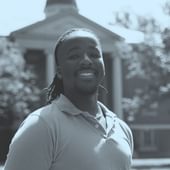
Nathanael Bagonza

Lou Bernieri
Director of Andover Bread Loaf, English Instructor, Football and Track Coach, Complimentary House Counselor, Academic Advisor [email protected] view full profile“My work with Andover Bread Loaf and my work on the PA campus enables me to work in two dramatically different contexts.”
IN THE CLASSROOM:
Writing for Change | ENG501WT
This is a service-learning course in which students discover and/or develop the writers within themselves and then are trained as Andover Bread Loaf Writing Leaders. (Andover Bread Loaf is a Phillips Academy outreach program.) As such, they acquire the capacity to assist teachers in organizing writing programs and to organize programs of their own. Through in-class workshops, students experiment in many different genres of writing in a supportive, creative learning community. These workshops also provide students with methods they can use in working with other K–12 youth.
Readings include poetry and prose texts as well as books about educational theory and practice, such as Multiplication is for White People by Lisa Delpit and Pedagogy of the Oppressed by Paulo Freire. The service-learning component of the class consists of working in nearby Lawrence, Mass., public school classrooms during the period ENG501WT meets. This course is a collaboration among PA’s English department and Community Service program, Lawrence Public Schools, and Lawrence community organizations. Students are invited to join the Andover Bread Loaf Teacher Network and participate in the conferences, workshops, and events the network offers throughout the year.
Mr. Bird’s fields of expertise include poetry and poetics, and the literature of the English Renaissance and 17th century, but he is also interested in Modernism and the avant-garde in literature and cinema, and Surrealism, in particular.

Leon Calleja
Chair of the English Department on the Richard A. Lumpkin Teaching Foundation Instructor in English, Boys' Tennis Head Coach, House Counselor [email protected] view full profile“I am Chair and Instructor in the English Department. I currently teach English electives that explore the intersections of law, literature and philosophy. I also serve as Head Coach of the Boys Varsity Tennis team and am a House Counselor in Chase House, where I live with my family.”
IN THE CLASSROOM:
Law and Literature | ENG521/2LL
ENG521LL, Term 1—Exploring Narrative. This course explores the role of narration and storytelling in law, politics, and literature. It begins with a study of what narrative is, drawing from readings in literature, philosophy, and psychology. Equipped with a working definition, students will then investigate the narrative form in action across the disciplines of law, politics, and literature. What role does storytelling play in our law and politics? How do the stories of literature impact our understanding of law and politics?
ENG522LL, Term 2—Exploring Metaphor. This course explores the power and role of metaphor in law and literature. Drawing from interdisciplinary sources, students will study competing theories on the nature of metaphor and its particular importance in the disciplines of law and literature. Along the way, students will grapple with two works of literature where the nature of metaphor is on display: Vladimir Nabokov’s enigmatic novel Pale Fire and the poems of Wallace Stevens in The Palm at the End of the Mind. Some questions we will struggle with include what is the relationship between metaphor, truth, and literal meaning; how do metaphors generate their meanings; and how, if at all, might metaphors expand or contract our understanding and experience of the law, the world, and ourselves? Student work will consistof the analytical essay, discussion board writings, and some introduction to the practice of legal writing and advocacy. In both terms, readings will draw from a wide range of disciplines and genres, including legal opinions; cultural, political, and philosophical essays; poems; a novel; and/or a play.

Deborah Chase
Instructor in English, House Counselor, Advisor, Girls' Varsity Tennis Coach, Girls' JV Squash Coach [email protected]“Twelve students around a table grappling with a novel, connecting with each other, and learning about themselves and the world in doing so; it doesn’t get much better than that.”

Stephanie Curci
Instructor in the English Department, House Counselor in Stevens, JV2 Squash Coach, Scorpio [email protected] view full profileMs. Curci's favorite building on campus is Bulfinch—or anywhere she can chat with students about books, history, and pop-culture.
IN THE CLASSROOM:
The History and Literature of the Haitian Revolution | ENG540HR
Few events have been as transformative and far reaching in effect—yet so untaught and unlearned across the humanities—as the Haitian Revolution, which occurred from 1791 to 1804. This interdisciplinary course will investigate the revolution and its legacy and attempt to address, at least in part, the monumental significance of the only successful large-scale slave rebellion in the Atlantic World. By 1804, the newly independent Haitians, freed by their own hands, had won for themselves a unique inheritance: theirs was a society born of the Age of Revolutions and animated by the Enlightenment-inspired language of liberty, but equally theirs was a society deeply rooted in African and Afro-Caribbean slave culture. In its independence, Haiti became the center of a transnational black diaspora as it defended its existence at a time when the United States and European colonial powers viewed racial slavery as the pillar of their burgeoning capital economies. This elective aims to explore these complicated ideas through a variety of texts, digital archives, fiction and nonfiction, literature, and history.
“I’ve been at Andover since 1999. I teach English, coach cross country and track, and advise day students. Over the years, I’ve lived and worked in the dorms and served on various committees, including the 2004 and 2014 Strategic Planning Committees and the 2025 Steering Committee. I’m a former English Department Chair (2009-2015) and Dean of Faculty (2019-2024). I’m also an Andover parent.”
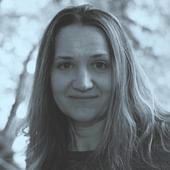
Sarah Driscoll
Assistant English Department Chair & Instructor: English 300 and Senior Electives, Advisor and Housing Complement [email protected]Sarah Driscoll is Assistant English Department Chair, teaches English 300 and senior electives, and serves as a student advisor and dorm complement.
You think your pain and your heartbreak are unprecedented in the history of the world, but then you read. It was books that taught me that the things that tormented me most were the very things that connected me with all the people who were alive, who had ever been alive.
”SAMPLE COURSES
Asian/American Literature and Film | ENG541AS
Students engage with a range of written and visual texts, including poetry, fiction, memoir, cinema, television, and scholarship, as they develop an analytical framework to better understand “Asian/American” work within the context of U.S. culture, politics, and history.
Creative Writing: Fiction | ENG505CF
A workshop-based course in which students have the opportunity to write and study short fiction with Andover’s current Writer-in-Residence, a published and acclaimed contemporary author.
Lockdown | ENG544LD
Through a blend of literature, film, social sciences, and experiential learning, students examine incarceration; ask questions about ethics, justice, self-expression, and social control; and gain a greater appreciation of art as a means of coping, testimonial, and witnessing.
¡El Cuco! Ghosts, Spirits, and the Supernatural in Latin America | ENG521LA
This course focuses on how Latin American writers in the 20th century weave paranormal presence into their stories—a literary tool that has become reflective of trauma or historical strife.
48
electives
13
students in the average class
1
outdoor classroom dedicated to beloved former instructor Jean St. Pierre
RESOURCES
The Brace Center for Gender Studies
The Writing Center
Andover's Writers' Alliance
RELATED STUDENT CLUBS
The Phillipian
The Courant
The Revere
Pot Pourri
